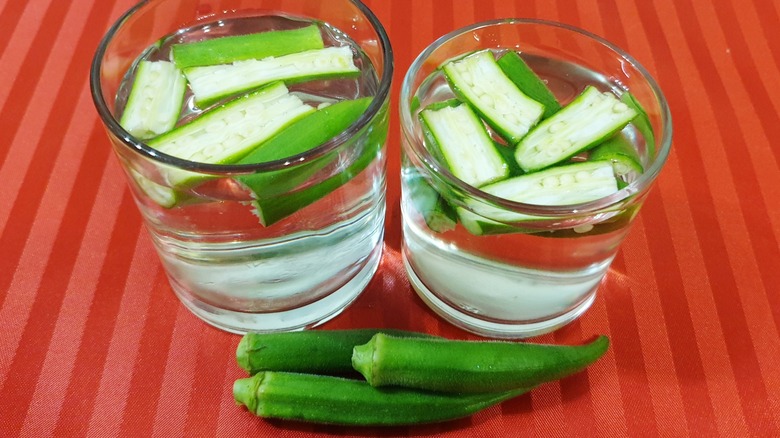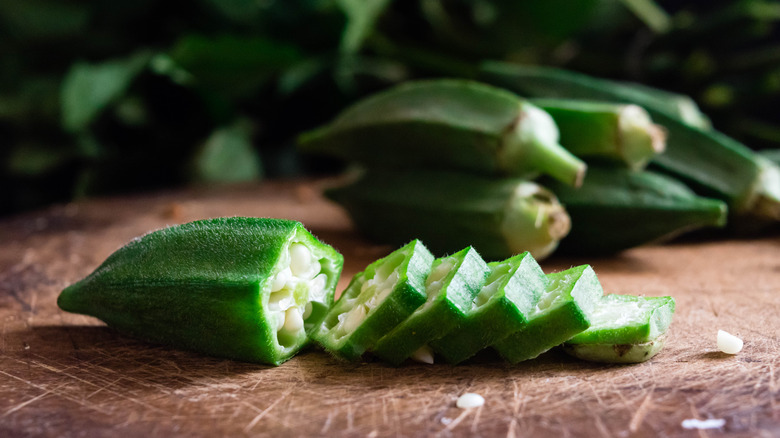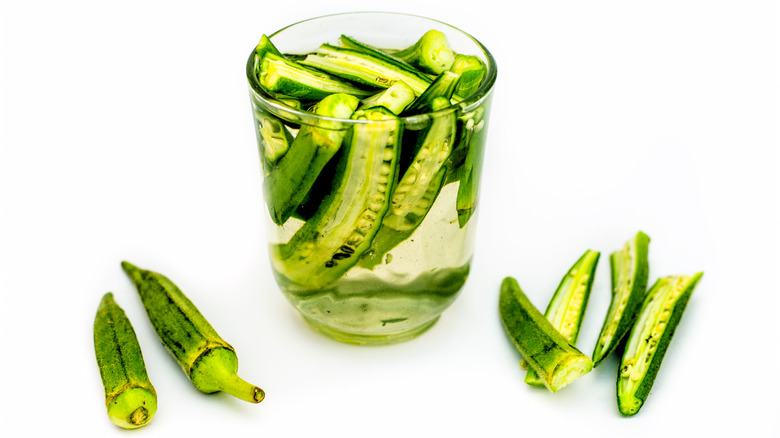Are There Nutritional Benefits To Drinking Okra Water?
Celery water is so 2023. If you've been on Wellness TikTok recently, you may have seen its hot new successor: okra water. According to some influencers, the latest health beverage du jour is good for clearing up your skin, losing weight, mitigating menstrual pain, and even improving vaginal lubrication (seriously). So naturally, you're probably wondering: Is there anything to it?
Okra water is made by soaking sliced okra in water overnight, then straining out the okra. The resulting beverage, to which some add lemon or honey for taste, is a cloudy, slightly greenish liquid that has a thick, slippery consistency to it. If you've ever had okra, you know that this comes from the naturally slimy inside of the okra pod, called its mucilage — a property of the vegetable that makes it reviled by some, but also what makes it an important thickening ingredient in dishes like gumbo.
As with most wellness fads, the answer is ultimately a big "maybe." There's no question that okra itself is good for you, given that it's a low-calorie and low-fat source of manganese, vitamin C, and fiber, along with thiamin, folate, magnesium, vitamin B6, and copper — all necessary nutrients for our bodies. The problem is that there isn't any reliable research on okra water, specifically, so it's unclear exactly how many of these nutrients actually transfer to the water.
A slimy silver bullet?
Influencers have been making big claims about okra water's supposed nutritional benefits, the most prominent of which is that it's supposed to increase vaginal lubrication and, related to this, make for easier vaginal birth. People commonly associate okra with sliminess, which is understandable, but there's no medically sound evidence that drinking okra water will make parts of you, er, slimier. The only support for these claims is a handful of individuals' anecdotal experience.
Some of the other claims people are making about okra water are unproven but do have some evidential and cultural backing. Okra and okra water have historically been used as a folk remedy in places like India and Ethiopia for digestive issues, possibly due to the presence of soluble fiber. In Ethiopia, pregnant people in particular are encouraged to eat okra, but the intended purpose is generally to treat pregnancy-related symptoms like constipation and stomach discomfort — not for vaginal lubrication.
All of this is to say that if you don't usually buy okra, and especially if you don't like it, there's probably no good reason to start drinking it. But if you already regularly keep the veggie on hand, there's no harm in dabbling with making your own okra water. Just don't expect it to be a magic cure for skincare, digestive issues, weight loss, or sexual health woes.
Eating okra does have benefits
Unless you're allergic to okra or prone to kidney stones (okra contains oxalate, which can cause kidney stones to form), there's no risk associated with consuming okra or okra water in moderate quantities. (Though, in large amounts, it can cause digestive issues in some people.) In fact, as stated above, the vegetable is full of important nutrients, and in recent years has been studied for its potential as a form of dietary medicine to treat common diseases, including cardiovascular diseases, digestive diseases, and type 2 diabetes.
There's reason to believe that it may benefit your skin, as it contains vitamins A and C, which support skin health. We know that it has antioxidant, anti-inflammatory, and lipid-lowering properties, among many others — what we don't know is exactly how much of okra's nutritional value is actually present in okra water. If you want to add okra to your diet for health reasons, you'll probably reap more benefits by just eating it — say, in the form of bhindi masala or simply sauteéd with spices.
However, okra water is still a hydrating beverage and proper hydration is important for virtually every part of your body to function properly. If making okra water gets you to drink more water in general, it's a net win. But if okra isn't already a regular feature on your shopping list, you can infuse your water with fruits and vegetables you already buy for essentially the same effect.


